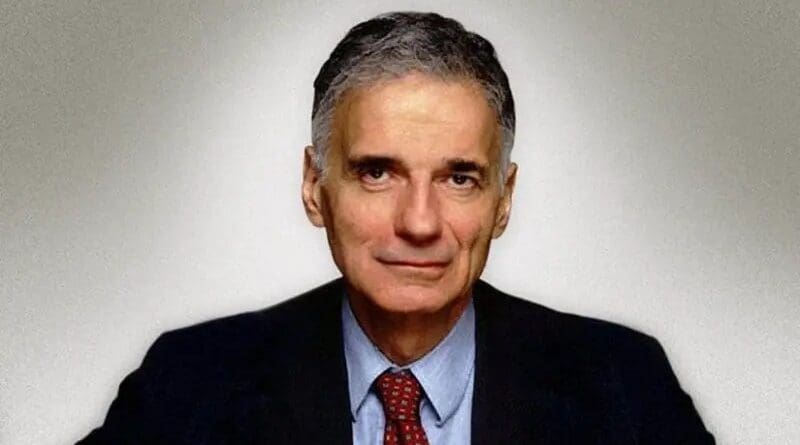Ralph Nader: Highly Recommended Books For 2019 Summer Reading – OpEd
By Ralph Nader
1. The Age of Surveillance Capitalism: The Fight for a Human Future at the New Frontier of Power by Shoshana Zuboff (PublicAffairs, 2019): You’re already experiencing the early stages of Big Corporations becoming Big Brother while Big Government becomes the Big Pussycat. Unfortunately, indentured Members of Congress drink the milk of campaign contributions and dream of industry job offers. This constructive book is chilling and will curb your digital enthusiasm.
2. Bottle of Lies: The Inside Story of the Generic Drug Boom by Katherine Eban (Ecco, 2019): This book exposes the price gouging U.S. Drug Companies that are outsourcing production of medicines (and their active ingredients) to China and India with disastrous results. We are at the mercy of these largely uninspected, often contaminated, foreign labs and are not given labeling information regarding the country of origin of vital medicines. Did you know that the U.S. no longer produces antibiotics? Once you read Eban’s work, you won’t look at prescription medications the same way.
3. Strength Through Peace: How Demilitarization Led to Peace and Happiness in Costa Rica, and What the Rest of the World can Learn From a Tiny, Tropical Nation by Judith Lipton and David Barash (Oxford University Press, 2018): Lipton and Barash expertly tell the story of how Costa Rica outperforms the U.S. in meeting basic human needs. The book humbles our native ethnocentricity and our culturally accepted, elementary school-taught myth that the U.S. has little to learn from other countries.
4. Banking on the People: Democratizing Money in the Digital Age by Ellen Brown (Democracy Collaborative, 2019): Brown offers an in-depth exploration of the problems with big banks and the “shadow banking” industry. The book explains how reckless bankers affect your livelihood, waste your tax dollars, and unduly influence an increasingly corporate-owned government. Nestle with this book until you see the wonderful future that could be ours, by recovering control of OUR OWN MONEY.
5. The End of Ice: Bearing Witness and Finding Meaning in the Path of Climate Disruption by Dahr Jamail (The New Press, 2019): The intrepid Jamail went to the shaken places where global warming is fracturing our planet in very plain sight. His book serves as a tour of climate disasters for the climate disruption deniers who ignore what is clearly happening before their very eyes.
6. Ethics, Politics, and Whistleblowing in Engineering by Nicholas Sakellariou and Rania Milleron (CRC Press, 2018): It is not only Boeing engineers whose better judgments about aircraft safety were overridden by profit-obsessed management (Axe the Boeing 737 Max!). Engineers in many industries provide expert judgments on the health, safety, and durability of products and processes. These experts are routinely ignored by avaricious corporate bosses looking to maximize profits at the public’s expense. A recent high profile example of this was the disastrous Boeing 737 Max crashes, which might have been prevented if Boeing management had heeded the advice of their more conscientious engineers. At last, there is a book with case studies, professional vision, and a cast of heroes for engineering students, practicing engineers, and all the rest of us that will raise our expectations for the engineering profession (Proud to say that Rania is my niece).
7. Conflicts of Interest In Science: How Corporate-Funded Academic Research Can Threaten Public Health by Sheldon Krimsky (Skyhorse Publishing, 2019): In this collection of articles, Krimsky delves into the devolution of scientific research from the integrity of academic science to the secret, profit-driven domination of corporate science. This book brings together many examples of the impact of corporate funded research on health and safety. Taxpayer dollars and public trust are at risk in the current scientific climate. Krimsky compellingly advocates for full disclosure and the need to shield university scientists from the pressure or temptation to sell out consumers, workers, and the environment.
8. Viking Economics: How the Scandinavians Got It Right-and How We Can, Too by George Lakey (Melville House Books, 2016): Given the upcoming presidential primaries and elections, this book is a contemporary necessity. Lakey illustrates how Sweden, Norway, Denmark, and Iceland have used social democratic policies to make their citizens the world’s healthiest and happiest people. Relatively, the Nordic countries are a model for good governance, equitable prosperity, and responsible environmental leadership. This is the “most fun economics book” you’ve never read. Voters and candidates alike should read it before the November 2020 election.
9. Whistleblower at the CIA: An Insider’s Account of the Politics of Intelligence by Melvin A. Goodman (City Lights Books, 2017): As a career CIA intelligence analyst and truth-teller Goodman shows how the secretive CIA has been anything but “intelligent.” The modern CIA blunders through the world with major, inaccurate forecasts, violent covert action, general lawlessness, and cover-ups that ignore President Harry Truman’s original intention for the organization. This book explains why CIA actions have contributed to our country’s disastrous foreign policy. A personal, readable, and authentically patriotic story.
10. Midnight in Chernobyl: The Untold Story of the World’s Greatest Nuclear Disaster by Adam Higginbotham (Simon and Schuster, 2019): Adam Higginbotham’s recent book prompted one reviewer to say that the author “gives us a glimpse of Armageddon.” The atomic power meltdown in Ukraine 33 years ago has produced a large uninhabitable region and driven deadly radiation effects, short and long term, into humans, their genes, and the flora and fauna. Together with the widely viewed HBO series on Chernobyl, this book explains why people should reject any notion that nuclear energy is a solution to global warming. Far, far better is to invest in energy conservation, solar energy, and wind energy – energy options that are cheaper, quicker, safer, and more community based. The catastrophic consequences and security threats posed by using nuclear power (the purpose of which is to boil water) are unacceptable. Remember Fukushima—nuclear disasters can happen anywhere.

